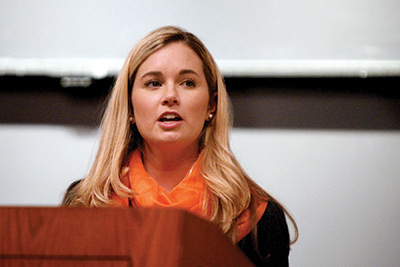Q & A with Caitlin La Ruffa
 Christian Union: The Magazine interviewed Caitlin La Ruffa, the director of the Love and Fidelity Network in Princeton, New Jersey.
Christian Union: The Magazine interviewed Caitlin La Ruffa, the director of the Love and Fidelity Network in Princeton, New Jersey. The mission of the Love and Fidelity Network (LFN) is "to equip college students with the resources, support, and arguments they need to uphold the institution of marriage, the special role of the family, and sexual integrity within their university communities."
On October 30-31, the LFN hosted the Sexuality, Integrity, and the University Conference at Princeton University. Over 300 students attended the event, and nearly 300 more watched via live video stream.
How did the Love and Fidelity Network begin?
The Love and Fidelity Network actually grew out of a student club at Princeton University. The Princeton Anscombe Society was founded in 2005 in response to the one-sided conversation on matters of human love and sexuality on campus. This group of students wanted to provide the other side of that conversation – demonstrating that students who held sincere commitments to premarital abstinence and marital fidelity had good reasons to do so. They also wanted to offer a "safe space," so to speak, for students who felt alienated by the messages the university was promoting and the hookup culture it abetted. Word spread – with the unintentional help of the New York Times – and it became clear that students on other campuses (first Harvard and then many others) wanted coaching and support in order to launch a similar initiative on their own campuses. Thus, the Love and Fidelity Network was born to respond to that need.How is your conference helping spread the message of sexual integrity on campuses?
The annual Sexuality, Integrity, and the University Conference is designed to equip students with the best arguments and latest research and motivate them in their leadership on campus. We believe students themselves are best equipped to serve their peers by offering them the truth about human love and sexuality – and so we aim to give these leaders the education and inspiration they need to go back to their home institutions and do just that.What were some of the highlights of this year's conference?
The lineup was especially powerful with George Mason University Law Professor Helen Alvaré sharing some very creative ideas about how to create a flourishing marriage culture in our current environment; Brad Wilcox, Associate Professor of Sociology at the University of Virginia and the director of the National Marriage Project, outlined how a lack of marriage and marriage culture really hurts the least of these - children from impoverished backgrounds; and Dawn Hawkins, executive director of the National Center on Sexual Exploitation, and William Struthers, professor of psychology at Wheaton College, gave a shared presentation on the harms of pornography and what this generation can do to fight back.What are the best ways to equip students?
The simple knowledge that they are not alone in wanting lasting love, not alone in being dissatisfied by the romantic options on campus, and not alone in valuing a stable marriage and family life in the future goes a long way. Donna Frietas, a researcher whom LFN student groups often host as a campus speaker, reports in her book, The End of Sex, that she finds dissatisfaction with the campus hookup scene and desire to date so commonplace among the students she interviews that she has often been tempted to tell an interviewee on the way out, "Go ask the next person in the waiting room out on a date – chances are they want to date, too!"Knowing, too, that there are really good intellectual arguments to be made in favor of sexual integrity and marriage (and what those arguments are) is key when, so often, students are surrounded by peers, professors, and administrators who tell them the only reason anyone holds certain beliefs or makes the choice to remain abstinent prior to marriage is because they blindly believe whatever they've been taught in their "backward" upbringing.
What are some of the truths you try to instill and some of the lies you look to expose regarding sexuality?
There are so many lies our culture has bought into when it comes to sexuality. For instance, sex has no intrinsic meaning and can mean whatever we want it to; everyone is "doing it" and is generally happy with the hookup culture; people grow out of "hooking up" after college; you need to "shop around" a lot to find the right spouse; you need to "test drive" a relationship – both in the sense of finding out if you are "sexually compatible" and to try out living together in order to have a successful marriage... These examples barely scratch the surface.We coach the students we work with to tackle these lies – and a host of other ones – in bite-size chunks. For instance, bringing in a speaker who can expose the lie that pornography is harmless recreation by sharing stories of women who have been exploited and abused to produce the material. Or presenting more accurate information about cohabitation, pointing out the research that suggests it is linked with a higher risk of divorce and a decrease in the freedom a person has to make a real decision to marry (or not) a potential spouse.





